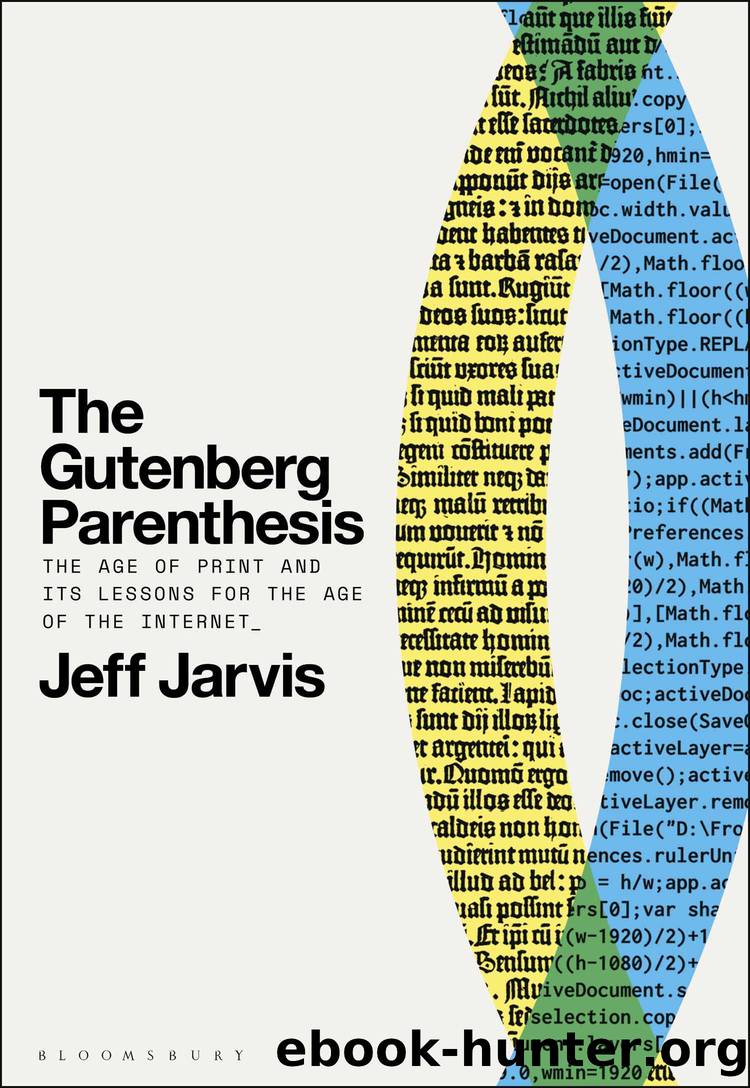The Gutenberg Parenthesis: the Age of Print and Its Lessons for the Age of the Internet by Jeff Jarvis

Author:Jeff Jarvis [Jarvis, Jeff]
Language: eng
Format: epub
ISBN: 9781501394843
Publisher: Bloomsbury Publishing
Published: 2023-04-25T00:00:00+00:00
âRepublics require conversation, often cacophonous conversation, for they should be noisy places.â75 So said the late Columbia Professor James Carey, a scholar of communication as culture. Carey understood, better than anyone I have read, the primacy of conversation in our conception of the public and of the role of the press in it. He informs my thinking about what kind of conversation we should strive for in this time of the universal press.
As he formulated his own theories, Carey synthesized the thought of early scholars in communications, Walter Lippmann and John Dewey. In his classic 1922 work Public Opinion, Lippmann complainedâas we do todayâthat the news comes at us too fast. He insisted that the public is incapable of gaining sufficient knowledge and expertise to make informed decisions. When he was being generous, he said the âomnicompetent citizenâ is an impossibility because âthe real environment is altogether too big, too complex, and too fleeting for direct acquaintance.â When he was less charitable, Lippmann averred that âthe mass of absolutely illiterate, of feeble-minded, grossly neurotic, undernourished and frustrated individuals, is very considerable.â76 The industry meant to inform the public, the press, is fundamentally flawed. âThe press is no substitute for institutions,â said Lippmann. âIt is like the beam of a searchlight that moves restlessly about, bringing one episode and then another out of darkness into vision. Men cannot do the work of the world by this light alone. They cannot govern society by episodes, incidents, and eruptions.â True. As Lippmann said, ânewspapers necessarily and inevitably reflect, and therefore, in greater or lesser measure, intensify the defective organization of public opinion.â
Lippmann put his faith instead in experts, proposing a priesthood of panels populated by scientists and others who would inform not the public but instead their elected officials and administrative leaders. Lippmann thus segregated information and expertise from politics and public opinion, contending that âthe power of the expert depends upon separating himself from those who make the decisions, upon not caring in his expert self, what decision is made.â His vision is especially difficult to imagine now, in a time of resistance to expertise and institutions. And one must ask: Expert in what? Who is expert in racism and inequality but those who are burdened with the consequences? Who is expert in disability but those who live with its boundaries? Are the experts in police violence the police or the objects of it?
Dewey countered Lippmann: âNo government by experts in which the masses do not have the chance to inform the experts as to their needs can be anything but an oligarchy managed in the interests of the few.â A society in which the public is mute save for the ballot box must be one in which considerable resources are spent on manipulating voters via propaganda. Administration by experts rather than political cronies seems a worthy goal. But, Dewey said, âthis revival of the Platonic notion that philosophers should be kings is the more taking because the idea of experts is
Download
This site does not store any files on its server. We only index and link to content provided by other sites. Please contact the content providers to delete copyright contents if any and email us, we'll remove relevant links or contents immediately.
| Booksellers & Bookselling | General |
| History of Books |
4 3 2 1: A Novel by Paul Auster(12391)
The handmaid's tale by Margaret Atwood(7763)
Giovanni's Room by James Baldwin(7346)
Asking the Right Questions: A Guide to Critical Thinking by M. Neil Browne & Stuart M. Keeley(5775)
Big Magic: Creative Living Beyond Fear by Elizabeth Gilbert(5771)
Ego Is the Enemy by Ryan Holiday(5447)
The Body: A Guide for Occupants by Bill Bryson(5096)
On Writing A Memoir of the Craft by Stephen King(4943)
Ken Follett - World without end by Ken Follett(4731)
Adulting by Kelly Williams Brown(4574)
Bluets by Maggie Nelson(4556)
Eat That Frog! by Brian Tracy(4540)
Guilty Pleasures by Laurell K Hamilton(4448)
The Poetry of Pablo Neruda by Pablo Neruda(4106)
Alive: The Story of the Andes Survivors by Piers Paul Read(4031)
White Noise - A Novel by Don DeLillo(4009)
Fingerprints of the Gods by Graham Hancock(4004)
The Book of Joy by Dalai Lama(3986)
The Bookshop by Penelope Fitzgerald(3852)
